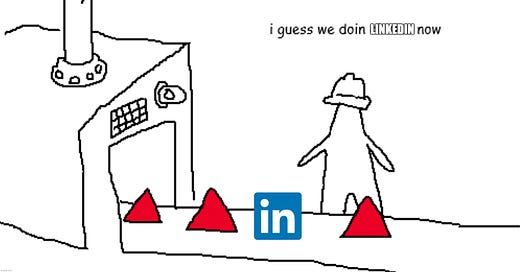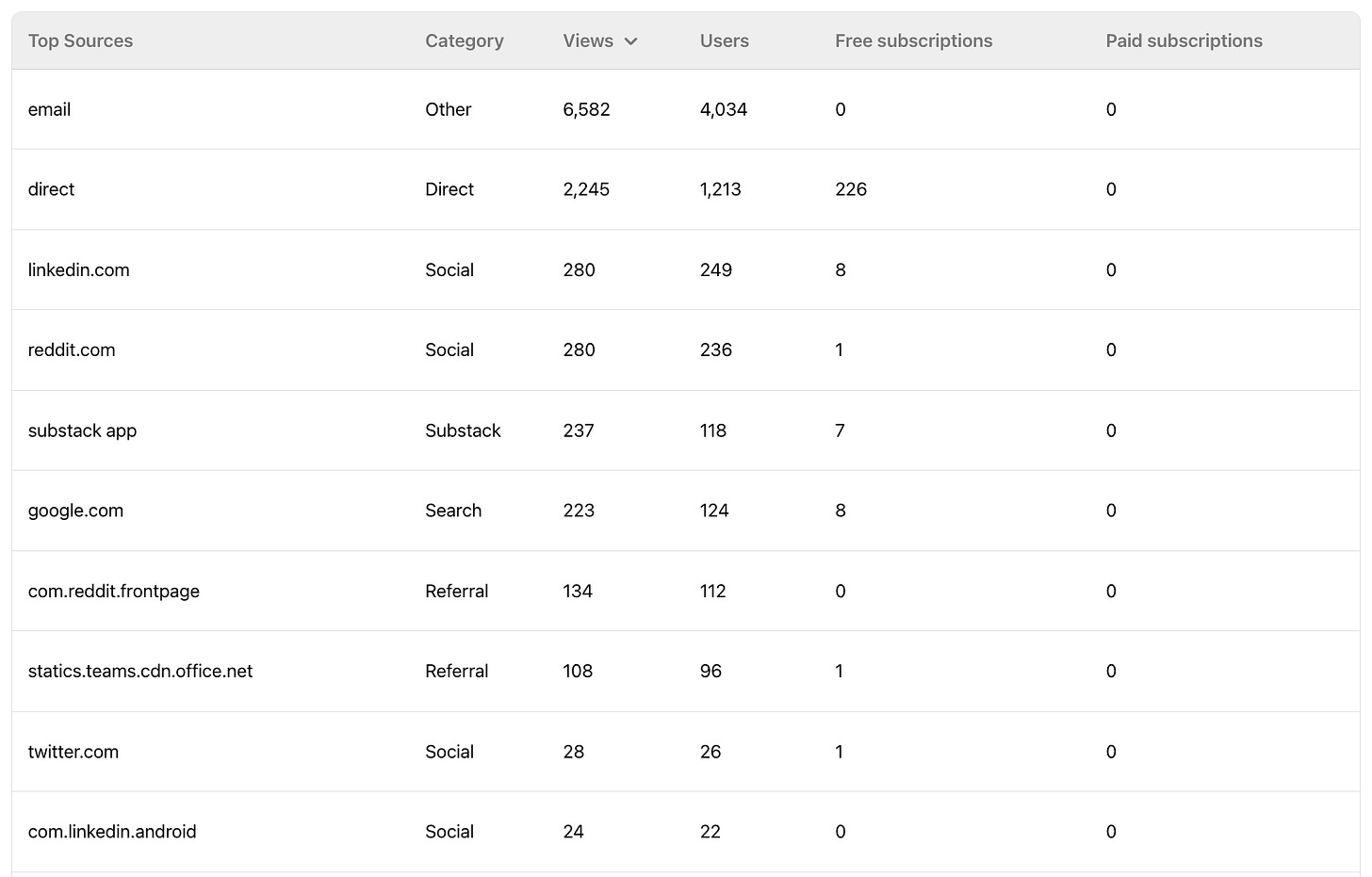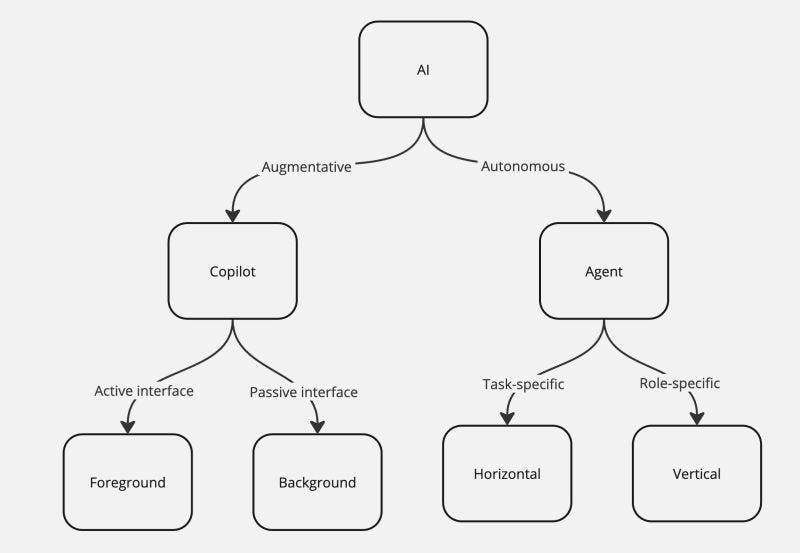Semi-Fortnightly Review: November 18
LinkedIn stan, AI categorizations, a whole bunch of Epic, and other recent news
It’s become shockingly apparent to me recently that, for better or worse, I have evolved into a LinkedIn guy. This is a totally unexpected change - I am that which I swore I never would become. It was not so long ago that I was the biggest promoter of this excellent article by Fadeke Adegbuyi that detailed all its flaws:
Product bloat with poorly copied features like Stories and broken tooling like name pronunciation
Problematic networking pieces, where randos connect and DM ad nauseam and crowd out the actual people you know
Odd social network characteristics with dramatic, often-fabricated stories, hustle culture clickbait, and an undeniably annoying writing style
I don’t think any of that has necessarily gone away. In particular, point 2 has only worsened with a torrent of AI-generated inbounds every day.
But here I stand, now definitively writing about it in a positive light. This is not a post-election, anti-Musk rejection of X. It is more a function of the observation that in A/B tests of posts between the two platforms, LinkedIn now results in substantially more interesting and verbose dialogue than Twitter.
For instance, we can use data objectively and look at my recent post on AI application layer market categorization:
Twitter: 1 comment, 2 retweets, 7 likes, and 1,356 views
LinkedIn: 24 comments, 12 reposts, 103 likes, 7940 impressions
Similarly, we see Twitter is significantly outperformed by LinkedIn and (even more shockingly) Reddit for last week’s article on Epic:
This isn’t about numbers maxing, building a brand, or anything of this nature. Peak Twitter, for me, represented a social tool where the algorithm and network effects allowed you to burrow into the deepest nooks and crannies of topics you liked, meet like-minded people, and engage in interesting discussions.
So, somehow, in some way, LinkedIn has become that place (at least for me). Perhaps their intrepid Product Managers were wrongfully scorned and now have refocused their youthful Gen Z energy on algorithm optimization. Perhaps I am just getting old, and LinkedIn is a gravitational pull for new parents drifting into the latter half of my 30s. Twitter remains in the repertoire for consumption of things like tip-of-the-spear news or sports, but the value is increasingly not worth it for any content creation time there.
Bluesky and Network Effects
Yes, I am dabbling with Bluesky. From a product perspective, if they can be Twitter but actually focus on the small features to improve the experience (DM search), I’d be excited to switch on paper.
However, I can’t shake the feeling that the current exodus from Twitter mirrors the flight of conservatives from the platform to Parler and Truth Social after the 2020 elections. In generations prior, people threatened to leave the country after the election broke the way they didn’t like - is today’s equivalent mini-migrations across social networks?
The reality of Twitter and other online communities ultimately is that switching costs are high due to network effects. Without portability of my existing network to Bluesky, I have to spend a lot of energy to tailor the experience to my liking. Even after doing so on LinkedIn, I probably have the time and energy to do that for Bluesky, but many do not. Lowering switching costs is key to would-be Twitter disruptors. If social networks were interoperable, we’d see more competition across them, but that seems like a regulatory pipe dream.
So, this full intro is just to acclimate you to the fact that I have been posting relatively frequently to LinkedIn on the topics of interoperability, regulation, EHRs, and industry news. Knowing that many readers lack the time, activation energy, or mental fortitude to wade into and cultivate that new frontier, I thought to do a periodic round-up of those posts to surface valuable content for you all. We specifically choose the unit of measure of the fortnight because:
It’s chronically underused in society today. We must reject modernity and return to tradition.
It is an easy spelling mistake away from Fortnite and thus blesses this article with good Gen-Z vibes.
It’s a spacious enough period to deliver relatively reliably even with holidays, work, vacations, and unexpected global events (hence the semi).
Anyway, onto the update:
The Election
The election happened this month, leaving us now in the liminal lame-duck space as agencies rush to close out work and the new administration gears up to effect change controlling the White House, both legislative chambers, and the judiciary. I had a few predictions and thoughts in the lead-up:
The Election and Health Tech Regulation: A pre-election post musing on HTI-2, TEFCA, and antitrust policy. While overall healthcare antitrust may lighten, there are clear signs that tech (and possibly health tech) will be held to a different standard.
Mike Pence’s Think Tank and HTI-2: I’d forgotten about Mike Pence until I stumbled upon his advocacy group’s comment on the ASTP’s proposed rule. It offers some perspective into what the next administration might do in regards to that rule, at least if they pursue social causes aggressively.
Trump and Milei: Before the announcement of the Department of Government Efficiency, Trump was already signaling with his meeting with the President of Argentina, Javier Milei, that federal government size and sprawl might be a focus for the next administration. Milei is well-known at this point for aggressively reducing Argentina’s bureaucracy. It’s worth remembering that the Republicans briefly discussed removing the ONC (now ASTP) entirely in 2017 - could they pursue this again?
TEFCA
Oracle Applies for QHIN Status: As we potentially see the public sector lighten support for TEFCA, the private sector continues to move into a leading role. While Oracle’s announcement is less clear in terms of timelines than Epic, MEDITECH, or athenahealth’s migration plans, it adds further weight to the movement toward this pattern of exchange.
TEFCA Onboarding Process Announced: The Recognized Coordinating Entity (RCE) released the SOP for the “Exchange Purpose (XP) Vetting Process”, which is a fancy term for “checking new participants/subparticipants before they can access the nation’s health data.” It’s a lot of friction, which is painful for organizations that serve smaller practices, but it’s somewhat necessary given the constant abuses we’ve seen.
AI
Oracle Announces a new AI EHR: If you’re looking for reasons to be bullish about Oracle in healthcare, this is it. Competitive disruption comes not from reinventing the wheel but from creating a successor to the wheel. The strongest case for Oracle clawing back market share is by pursuing a vastly different platform and paradigm.
A Framework for AI Across Industries: A relatively short classification system for AI tools, including some theses on why investment dollars are flowing today to scribes even though long-term upside is much higher elsewhere.
Epic’s AI Roadmap: Far from sleeping on the job or outsourcing all their AI, Epic is (as usual) sprinting internally to build everything AI. This is good for clinicians but bad for many startups.
Epic
Epic Takes on Debt: The common wisdom is that Epic doesn’t take on outside capital, so I was surprised to learn that’s not true. It’s mostly limited to operational costs, like building their campus, but it's still intriguing.
The NOVO Health Debacle: With so much scrutiny on Epic lately, I was surprised to find that they have another lawsuit ongoing related to the failed NOVO Health implementation. I covered this in more detail in last week’s “The Epic Defense: A Legacy of Protected Innovation.”
Epic is live with USCDI version 3: The continued iteration of USCDI adds new data for developers to play with and patients to access. It’s worth noting when this becomes available. Since posting, I’ve learned that other EHRs, like MEDITECH, have had this live since early 2024.
Particle v. Epic Update: Particle submitted a response to Epic’s motion to dismiss. The likely outcome (as a non-lawyer) is that the case is not dismissed and proceeds, but with the requirement that Particle repleads with a more realistic market definition that includes other competitors.
Info Blocking
Start Submitting Information Blocking Complaints: No other industry has a rule similar to information blocking. Yet, for some reason, it is dramatically underutilized by companies in a B2B setting, with most complaints coming from patients:
Real Time Medical Systems v. PointClickCare Update: RTMS submitted their response brief to the appeals case that started this summer. I want to point out (again) that this case is infinitely more important to the industry than the sexier and more well-known Particle v. Epic case. The shape of information blocking interpretation and enforcement is taking form, currently setting an extremely broad aperture for what might be blocking and allowing for private action (lawsuits) in addition to administrative complaints. Every EHR and digital health company should be paying attention.
AI, APIs, and Information Blocking: This is sorta AI, but it's more important to sort as Information Blocking. There's a lot of wishful thinking about what information blocking is or isn't. The reality is that it heavily constrains EHR vendors from playing favorites with API access. The Cures Act makes clear - blocking write APIs for some AI scribes while allowing it for others is likely illegal information blocking. Andrew Hines of Canvas Medical had an articulate response voicing some concerns, so I’m excited to discuss and write more about this in the future.
Other News
Surescripts and Payers: Surescripts is making their first public product move after their private equity acquisition: opening up their Medication History for Populations product to payers. This had already been available to providers, but it is still an interesting repositioning.
Compliance, Operations, or Security leader Available: A good friend of mine is looking for his next position:
External media
How the Particle v Epic Lawsuit Impacts Plan Sponsors and Public Health Trying to Get Data: Stacy Richter had me on the Relentless Health Value Podcast to talk about the Epic and Particle dispute and what it means for the industry.
What the HLTH: I joined Ellen Brown and BP2 on the always fun Reverse Mullet Healthcare Podcast to do a HLTH post-mortem and discuss the effects of the election, food as medicine, vaccines, and the recent Epic article.









